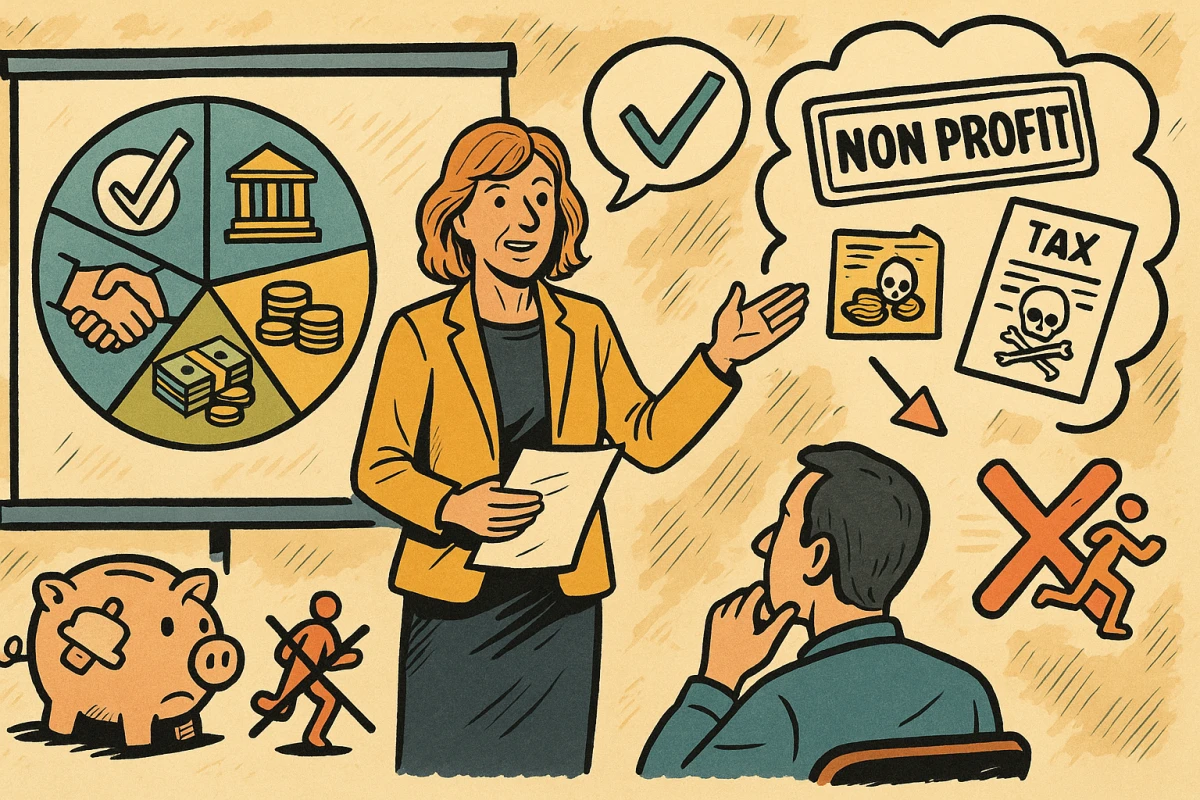Club Management Course part 5
The fifth part of the training focuses on non-profit status—the benefits and obligations associated with it. And how quickly it can be revoked if taxes and finances are not handled correctly.

Our lecturer, Karin Schluze Kersting, used dry humour and clear language to illustrate how important the topics of finance and taxes are in the context of associations. What I wasn't aware of was that non-profit status is essentially a tax office. And that means: There are advantages to the work of an association that other types of companies don't receive. If we fail to meet the obligations and requirements of the tax office, the advantage—i.e., non-profit status—is lost, and with it, usually the association.
Non-profit status and its revocation
When assessing taxation, the cash flows within an association are divided into so-called spheres of activity. There are four: the non-profit sector, the special-purpose operation, asset management, and commercial business operations. When managing finances, it is essential to accurately allocate cash flows to the relevant areas, which can be challenging. Not every tax advisor understands this topic, as it is not part of their standard training. This is something to keep in mind when selecting a service provider. The Vereinsservice Münsterland is a good first point of contact.
I find it shocking how quickly a non-profit status can be revoked. Minor financial errors have enormous consequences: In cases of doubt, the revocation is retroactive and means paying back taxes for previous years. This, combined with interest, often results in large amounts that lead to the association's insolvency.
To illustrate this, I brought along a few examples from the training:
- No refund of contributions if members are injured or ill and leave. The contributions are not tied to any specific service, and the repayment is not aligned with the association's purpose. This leads to revocation.
- If the association pays personal penalties, such as non-participation in a competition, this is also not in line with the association's purpose and leads to revocation.
The core of our obligation is to use the funds by the association's statutes. No new insights, as the statutes are our constitution – see Contents of the training course, part 4.
Volunteering and Trainers
Volunteers play an essential role in club life. Without this commitment, our rich club culture would not be possible. For example, to compensate volunteer trainers, there is a trainer's allowance (aka Übungsleitertpauschale). This doesn't even qualify for the minimum wage because the work is performed out of a sense of commitment to the club, rather than for financial gain.
A social approach that I support is the idea of collecting pension points through volunteer work—this rewards service to society. In my opinion, this is comparable to caring for relatives, for which pension points are already awarded.
Shine with Knowledge
I learned in the course that the donation receipt (Spendenquittung) is called a donation receipt (Zuwendungsbescheid – yeah doesn't work in English). This is another advantage of being a non-profit organization – only such organizations are allowed to issue these receipts. It is essential that an actual outflow of assets occurs. The donation should only be recorded in the amount of the assets that are being withdrawn – i.e., if a company donates an item, a receipt for the purchase price must be issued. Companies generally do not want to disclose this. To avoid this, an invoice is issued with the waiver in favor of a donation receipt, and the misery is averted.
Unconscious Incompetence – The Curse of Clubs
Competence Level Development refers to both conscious and unconscious competence and incompetence. Unconscious incompetence refers to a situation in which a person lacks a specific skill or knowledge but is unaware of their deficiency. These are the famous "We've always done it this way, and it more or less worked" statements. In my opinion, this, wrapped up in a sense of tradition, is one of the worst plagues in clubs, especially if this action carries the risk of losing non-profit status.
There's a lot to consider!
How do you approach people with such tendencies? Approach and proselytize, correct them in the background, or let them go?
Let's exchange experiences and advance our organizations!